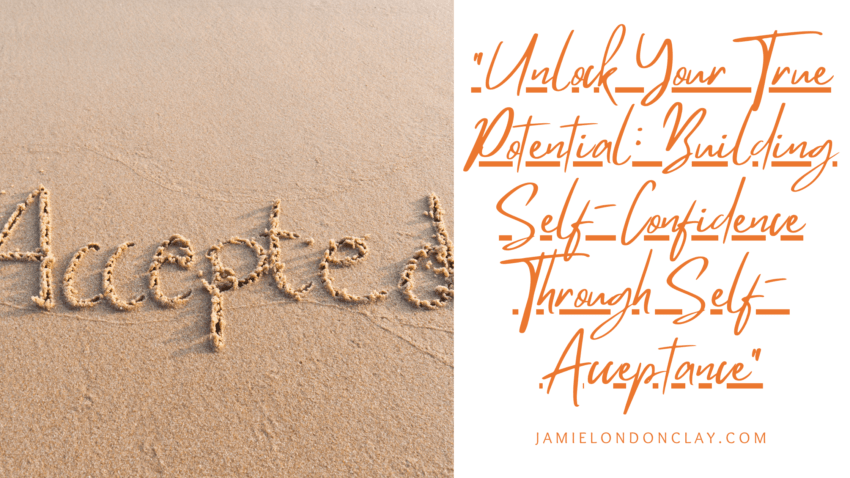
“Unlock Your True Potential: Building Self-Confidence Through Self-Acceptance”
Discover powerful strategies to boost your confidence and self-esteem through unconditional self-acceptance. Learn how to embrace your uniqueness and unleash your full potential. Read more to enter on a journey of self-discovery and empowerment.
Greetings to a transformative journey towards self-fulfillment and empowerment! Did you know that 85% of people suffer from low self-esteem at some point? Moreover, studies have shown that individuals with higher levels of self-acceptance are more likely to experience greater life satisfaction and psychological well-being. It’s time to break free from the shackles of self-doubt and insecurity.
This article will explore the profound connection between building self-confidence and practicing self-acceptance. Together, we’ll explore actionable steps and insights to cultivate unshakable confidence from within.
I’m going to kick things off by being honest about self-acceptance. It’s not just about feeling okay with who you are; it’s the foundation of building self-confidence. When you truly accept yourself, warts, and all, you stand taller and shine a bit brighter. That sounds nice, but how do you start embracing those flaws?
Understanding the connection between self-acceptance and self-confidence is crucial. It’s simple: When you stop battling against your imperfections and instead acknowledge and embrace them, your self-esteem gets a natural boost. It’s like taking off a heavy backpack you didn’t know you were carrying. Suddenly, everything feels a bit easier.
These aren’t feelings; there’s a practical side. Reflect on successful people you admire. Isn’t their confident aura often linked to their authenticity and acceptance of their unique selves? By recognizing that they’re not perfect, these individuals resonate with confidence and inspire others to follow suit.
I’m here to help you hop on this bandwagon and make self-acceptance a regular part of your day. Realizing that imperfections are part of human experience. It is liberating and paves the way for genuine self-confidence. So, to build your confidence and self-esteem, start by giving yourself the gift of self-acceptance.
By nurturing a forgiving and realistic view of ourselves, we lay the groundwork for more extraordinary things—like a daily practice of confidence-building. Choose something that resonates with you; there’s no one-size-fits-all here. And remember, your journey toward self-acceptance and building self-confidence is uniquely yours.
What is Unconditional Self-Acceptance?
Unconditional self-acceptance means fully embracing oneself and flaws without conditions or limitations. It involves acknowledging and embracing every aspect of one’s being, including strengths, weaknesses, successes, and failures, without judgment or self-criticism.
Unlike conditional self-acceptance, which is based on achieving specific standards or conditions, unconditional self-acceptance is not dependent on external validation or meeting specific criteria. It involves cultivating a deep sense of self-worth and self-respect essential to one’s identity.
Unconditional self-acceptance does not mean ignoring areas for growth or improvement. Instead, it involves recognizing areas where change is possible while still fully accepting oneself in the present moment. It is about treating oneself with kindness, compassion, and understanding, regardless of perceived shortcomings or past mistakes.
Unconditional self-acceptance can lead to greater resilience, emotional well-being, and inner peace. By embracing oneself unconditionally, individuals can experience greater self-confidence, authenticity, and fulfillment.
What Is the Connection Between Self-Acceptance and Self-Confidence?
The connection between self-acceptance and self-confidence is profound and symbiotic. Here’s how they intertwine:
- Foundation of Self-Worth: Self-acceptance forms the foundation of self-confidence. You recognize your essential worth when fully accepting yourself, including your strengths, weaknesses, and imperfections. This recognition serves as a solid foundation upon which self-confidence can flourish.
- Reduced Self-Criticism: Self-acceptance diminishes the tendency toward harsh self-criticism and negative self-talk. Instead of constantly criticizing yourself for perceived flaws or shortcomings, you cultivate an attitude of self-compassion and understanding. This shift in mindset frees up mental energy that can be redirected towards building self-confidence.
- Authenticity and Inner Alignment: Embracing who you genuinely are fosters authenticity and inner alignment. You naturally exude confidence when your actions, beliefs, and values are in harmony with your true self. There’s no need to put on a facade or seek validation from others because you’re secure in your authenticity.
- Resilience in the Face of Challenges: Self-acceptance nurtures resilience by teaching you to bounce back from setbacks with grace and resilience. Instead of viewing failures or setbacks as reflections of your worth, you see them as opportunities for growth and learning. This resilient mindset reinforces self-confidence, knowing you can overcome obstacles and thrive despite adversity.
- Freedom from Comparison: When you truly accept yourself, you’re less likely to engage in detrimental comparisons with others. You understand that everyone is on their unique journey, and you are content with your path. This freedom from difference lets you focus on your progress and accomplishments, boosting self-confidence.
Self-acceptance and self-confidence are interdependent aspects of personal growth and well-being. Cultivating self-acceptance lays the groundwork for building genuine self-confidence while nurturing self-confidence reinforces the practice of self-acceptance. Together, they create a powerful synergy that empowers individuals to live authentically and thrive in all areas of life.
Tools and Techniques to Build Confidence and Self-Esteem
Now, how can I build my confidence and self-esteem? Well, there are actionable methods that can help you strengthen these qualities within yourself. Cultivating self-esteem might seem hard at first, but remember, it’s a skill that improves with practice.
Daily self-acceptance is vital. You can use practical exercises like standing in front of a mirror, looking yourself in the eye, and affirming that you are worthy and capable. You might feel awkward initially, but trust me, it will include a significant shift in how you perceive yourself over time.
Your internal dialogue plays a massive part in building self-confidence and self-esteem. However, if you’re constantly down on yourself, you’ll soon discover its detrimental effects. So, it’s essential to practice positive self-talk. Simple affirmations can be powerful. Try starting your day by saying, ‘I am enough,’ and watch how this small statement can seed confidence that grows throughout your day.
Mindfulness and reflection are also crucial techniques. They calm your mind and help you understand and become comfortable with your identity. Reflect on your successes and forgive yourself for your mistakes. This approach can do wonders for embracing yourself just as you are.
Throughout this section, I have provided several methods to increase self-confidence and self-esteem. But it’s also important to note that self-improvement is a journey.
That’s why I wrote ‘Unlocking the Power of Your Love: 5 Simple Ways to Practice Self-Love and Kindness Starting Now.’ This book can guide you further along this path with actionable advice and deep insight.
10 Effective Ways to Build Self-Confidence Through Self-Acceptance
- Practice Self-Compassion: Treat yourself with kindness and understanding, especially in moments of struggle or failure. Research by Neff, K. D. (2003) shows that self-compassion is strongly associated with higher levels of well-being and resilience.
- Challenge Negative Self-Talk: Identify and challenge negative thoughts that undermine your self-esteem. According to the National Science Foundation, the average person has about 12,000 to 60,000 thoughts per day, up to 80% of which are harmful.
- Set Realistic Goals: Break down your larger goals into smaller, achievable steps. Accomplishing these milestones boosts confidence and reinforces self-acceptance. A study by Locke & Latham (2006) found that setting specific and challenging goals leads to higher performance.
- Set Realistic Goals: Break down your larger goals into smaller, achievable steps. Accomplishing these milestones boosts confidence and reinforces self-acceptance. A study by Locke & Latham (2006) found that setting specific and challenging goals leads to higher performance.
- Celebrate Your Achievements: Acknowledge and celebrate your accomplishments, no matter how small they may seem. This cultivates a positive mindset and reinforces self-worth.
- Embrace Imperfection: Understand perfection is unrealistic and embrace your flaws as part of your uniqueness. Research by Brown, B. (2012) suggests that embracing vulnerability leads to greater self-worth and connection with others.
- Practice Gratitude: Regularly reflect on the things you’re grateful for in your life. Studies have shown that practicing gratitude improves self-esteem and well-being (Emmons & McCullough, 2003).
- Challenge Your Comfort Zone: Step outside of your comfort zone and take on new challenges. Each success, no matter how small, contributes to a sense of accomplishment and self-assurance.
- Seek Professional Help if Needed: If self-doubt and low self-esteem persist, don’t hesitate to seek support from a therapist or counselor. They can provide valuable guidance and tools to help you build self-confidence and self-acceptance.
- Engage in Self-Care: Prioritize self-care activities that nourish your mind, body, soul, and spirit. Taking care of yourself physically and emotionally enhances self-acceptance and confidence.
- Surround Yourself with Supportive People: Surround yourself with individuals who uplift and support you in your journey of self-acceptance. Social support has been linked to higher levels of self-esteem and resilience (Taylor, S. E., & Stanton, A. L., 2007).
Remember, building self-confidence through self-acceptance is a journey that requires patience, persistence, and self-love. Embrace each process step and watch as your confidence blossoms from within.
Navigating the Relationship Between Self-Confidence and Self-Love
How does self-love fit into the equation if you want to build self-confidence and self-esteem? It’s central. Imagine self-love as the foundation; when it’s strong, everything you build atop it—like self-confidence—stands firm.
It’s normal for people to see themselves as separate from others and focus on their shortcomings. But self-love flips the script. It’s about embracing who you are unabashedly so that you can shine with confidence.
Here’s the kicker: self-compassion is your ally on this journey. I’m not just throwing words around; I’m talking about being kind to yourself, even when you fail or fall short of your expectations.
Bringing gratitude into your daily life plays a huge part as well. Have you ever felt a wave of relief when you focused on what was going right rather than what wasn’t? That’s the power of gratitude in action. Concentrating on the positives makes self-acceptance more manageable, and self-confidence grows naturally.
Now you’ve seen how intertwined self-confidence and self-love are, and sure as the sun will rise, knowing this is key to your personal development. So, remember to nurture both because they will support each other and elevate your sense of self-worth to new heights.
I hope you do something to explore ‘Unlocking the Power of Your Love: 5 Simple Ways to Practice Self-Love and Kindness Starting Now‘. This book I’ve written is your guide to reinforcing the relationship between self-love and confidence.
It’s packed with insights and practical ways to nurture your self-esteem, day in and day out. I’m here to help you with these principles, so take the leap and discover how the strength of your self-love can unlock your full potential. The details are just a click away.
Cultivating Lasting Self-Confidence: Your Roadmap to Personal Growth
I’m going to let you in on something important. Self-assurance isn’t a one-off achievement; it’s a continuous journey. It’s about evolving and growing, one step at a time. You’ll discover how to lock in that newfound confidence for the long run.
Choose something that resonates with you. It could be a hobby, a skill, or setting personal goals. Engaging in activities that align with your interests is like adding fuel to the fire of your self-confidence. A lot happens quickly when you’re learning and succeeding, which is a solid foundation for your self-esteem.
This isn’t only about cultivating confidence but also about finding your community. Surround yourself with people who uplift you. Supportive friends, family, or even online communities can be pivotal. They offer encouragement, feedback, and the occasional necessary reality check.
Remember to set realistic expectations for yourself. You can constantly adjust your approach down the road. Your first attempt can be imperfect. Just focus on something other than perfection. Embrace the lessons from failures as much as the thrills of success.
The best way to consolidate your journey is never to stop learning about yourself. Reflect on your experiences, celebrate your wins, and keep your narrative positive. I like to leverage this strategy: regular self-reflection ensures that your self-confidence is founded on solid ground and built to last.
I hope you see the massive value in building self-confidence through self-acceptance. If you want to dive deeper, ‘Unlocking the Power of Your Love: 5 Simple Ways to Practice Self-Love and Kindness Starting Now’ can be your guide. Grab a copy at JamieLondonClay.com and take the next step in your self-love journey.
In Conclusion,
Empower yourself with self-acceptance, and watch as your confidence soars to new heights. Remember, the journey to building self-confidence through self-acceptance is ongoing, but the rewards are immeasurable. Take the first step today towards embracing your true self and unlocking your limitless potential.
Remember to subscribe to our blog for more empowering content, follow me on social media, share this article with your loved ones, and leave a comment below sharing your thoughts and experiences. Let’s inspire and uplift each other on this incredible journey of personal growth!


Hey Jamie,
Your article is fascinating as it explores the crucial connection between unconditional self-acceptance and genuine self-confidence, emphasizing how the former is the basis of the latter. It implies that living a more authentic and contented life can result from accepting and embracing our flaws. The focus on doable tactics for boosting self-esteem, like thankfulness and encouraging self-talk, intrigues me since they significantly impact our general well-being. It makes me wonder how cultivating gratitude might affect how we view ourselves daily. What part, in your opinion, does self-compassion play in getting over self-doubt? These questions are essential for gaining a deeper understanding of self-acceptance and how it markets confidence.
Hi Sara!
Great question! Here are my thoughts…
Self-compassion plays a crucial role in overcoming self-doubt in several ways:
Kindness towards oneself: Self-compassion involves treating oneself with compassion, understanding, and patience, especially during self-doubt. Instead of being self-critical or harsh, individuals learn to acknowledge their struggles with kindness and gentleness, which can help them navigate through self-doubt more effectively.Understanding common humanity: It’s important to remember that self-doubt is a universal experience. Everyone, at some point, has felt unsure or questioned themselves. Recognizing this can alleviate feelings of isolation and abnormality, reducing the shame or inadequacy that often accompanies self-doubt. This understanding can empower you to approach your self-doubt with greater acceptance and resilience.Mindfulness: Self-compassion involves mindful of one’s thoughts and feelings without judgment. By practicing mindfulness, individuals can observe their self-doubting thoughts without getting entangled. This allows for a more objective perspective, enabling individuals to challenge and reframe their self-doubts effectively.Self-soothing: When experiencing self-doubt, individuals often feel anxious, stressed, or overwhelmed. Self-compassion provides techniques for self-soothing, such as deep breathing, self-affirmations, or engaging in comforting activities. These strategies can help individuals regulate their emotions and reduce the intensity of self-doubt.Building resilience: Self-compassion encourages individuals to respond to setbacks and failures with self-kindness and understanding. Rather than being derailed by self-doubt, individuals can bounce back more quickly and persist in facing challenges.
Overall, self-compassion is a powerful tool in your journey to overcome self-doubt. It promotes a more nurturing and supportive relationship with yourself, enabling you to respond to your self-doubts with kindness, understanding, and resilience. By fostering personal growth and development, self-compassion can help you thrive in the face of challenges.
Thank you for your feedback I hope the above helps you with greater insight into how self-compassion can play a role in getting over self-doubt.